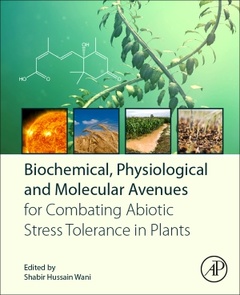Biochemical, Physiological and Molecular Avenues for Combating Abiotic Stress in Plants
Coordonnateur : Wani Shabir Hussain

Biochemical, Physiological and Molecular Avenues for Combating Abiotic Stress in Plants is a must-have reference for researchers and professionals in agronomy, plant science and horticulture. As abiotic stress tolerance is a constant challenge for researchers and professionals working on improving crop production, this book combines recent advances with foundational content, thus offering in-depth coverage on a variety of abiotic stress tolerance mechanisms that help us better understand and improve plant response and growth under stress conditions. The mechanisms explored in this book include stress perception, signal transduction and synthesis of stress-related proteins and other molecules.
In addition, the book provides a critical understanding of the networks of genes responsible for abiotic stress tolerance and their utilization in the development of stress tolerance in plants. Practical breeding techniques and modern genetic analyses are also discussed.
1. Transcription Factors Based Genetic Engineering for Abiotic Tolerance in Crops 2. Sugars Play a Critical Role in Abiotic Stress Tolerance in Plants 3. Polyamines Metabolism: A Way Ahead for Abiotic Stress Tolerance in Crop Plants 4. Cold Tolerance in Plants: Molecular Machinery Deciphered 5. Impact of Soil Moisture Regimes on Wilt Disease in Tomatoes: Current Understanding 6. Field Performance of Transgenic Drought-Tolerant Crop Plants 7. DNA Helicase-Mediated Abiotic Stress Tolerance in Plants 8. RNAi Technology:The Role in Development of Abiotic Stress-Tolerant Crops 9. Genome-Wide Association Studies (GWAS) for Abiotic Stress Tolerance in Plants 10. Targeting the Redox Regulatory Mechanisms for Abiotic Stress Tolerance in Crops 11. Compatible Solute Engineering of Crop Plants for Improved Tolerance Toward Abiotic Stresses 12. Single-Versus Multigene Transfer Approaches for Crop Abiotic Stress Tolerance 13. Crop Phenomics for Abiotic Stress Tolerance in Crop Plants 14. Overview on Effects of Water Stress on Cotton Plants and Productivity
Students, teachers and researchers in agriculture, plant science, and horticulture as well as those in environmental science
Additional audience includes plant-based companies and agribusiness
Included among his awards are:
Fellow of the Linnean Society of London-2017
YOUNG SCIENTIST Award (2017), Indian Ecological Society Punjab Agricultural University Ludhiana.
Young Scientist of the Year 2016, International foundation for Environment and Ecology Kolkata India.
YOUNG ACHIEVER AWARD – 2016, Society for Advancement of Human and Nature (SADHNA) YS Parmar University of Horticulture and Forestry
YOUNG SCIENTIST Award (2015), Society for Plant Research, Meerut, India
YOUNG SCIENTIST Award (2009), Society for Promotion of Plant Science Research. Jaipur National University, Jaipur.
FELLOW OF SOCIETY FOR PLANT RESEARCH AWARD – 2011-12
- Unlocks the physiological, biochemical and molecular basis of abiotic stress response and tolerance in crop plants
- Presents comprehensive information on abiotic stress tolerance, from gene to whole plant level
- Includes content on antioxidant metabolism, marker-assisted selection, microarrays, next-generation sequencing and genome editing techniques
Date de parution : 06-2018
Ouvrage de 324 p.
19x23.3 cm
Thèmes de Biochemical, Physiological and Molecular Avenues for... :
Mots-clés :
Abiotic stress; Adverse effects; Antioxidant; Antioxidant machinery; Cell organelles; Cold stress; Cotton; Crop; Crop improvement; DNA helicase; Drought; Drought stress; Environmental stresses; Field performance; Gene pyramiding; Gene stacking; Genetic engineering; Genetically modified crops; Glycine betaine; GWAS; MCM; microRNA; Osmolytes; Osmo-protectant; PDH45; Phenotyping; Physiological and morphological traits; Polyamine metabolism; Polyamines; Proline; Promoter; Ralstonia solanacearum; Reactive oxygen species; Redox homeostasis; RNA silencing; RNAi; ROS; Salinity; Signaling; Small interfering RNA; Soil moisture level; Solanum lycopersicum; Stress signaling; Stress tolerance; Sugar; SUV3; Temperature stress; Tolerance; Tomato; Transcription factor; Transcription factors; Transgene; Transgenic lines; Transgenic plant; Transgenic plants; Transgenics; Water stress; XPB; XPD; Xylem vessels



